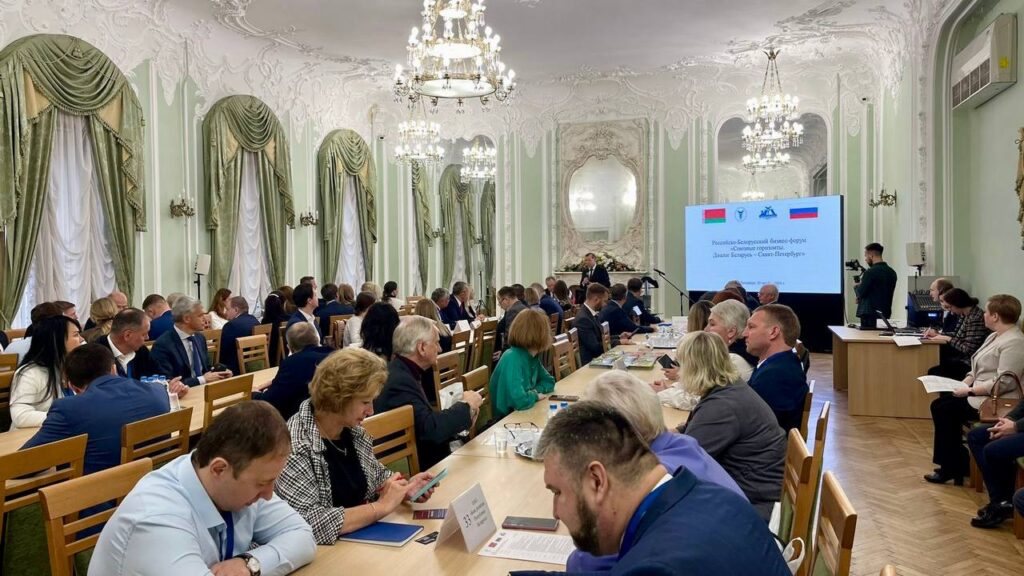This translation was generated using artificial intelligence. We strive for accuracy and quality, but automated translations may contain errors. You can read the original text here.
Since the early 2020s, Belarusian business has entered a historic stage of structural and cognitive transformation, driven by both external and internal factors. In several ways, the current situation echoes what happened about a century ago, when entrepreneurs as a social class disappeared from Belarusian territory for two generations. Fortunately, there are no clear signs that this could happen again. However, it is already evident that Belarusian business will never be the same as it was before 2020. Its players are changing, its structure is evolving, and so is its self-perception as a Belarusian business community.
How It Was
About a hundred years ago, the main external challenge that radically affected business in Belarus was the First World War.
The war led to the occupation of part of Belarusian territory, the evacuation of many local enterprises, and the migration of their owners to the interior provinces of Russia, to Ukraine, and to Central Asia. For the first time, business was divided into “friendly” and “unfriendly” — based on perceived loyalty. At the same time, the war provided a powerful boost to the growth of existing enterprises and the creation of new ones through state military contracts.
The internal factor that determined the development of entrepreneurship in Belarus for decades was the victory of the Bolsheviks in the Civil War.
The war entrenched a social and economic system for nearly 70 years in which private business had no place. Some entrepreneurs were physically eliminated, some emigrated to Europe and the U.S., and others were forced to adapt to new realities, shifting into social strata “permitted” by the state. As a result, Belarus lost its entrepreneurial class for two generations (a slightly shorter period in the western regions). This, among other reasons, contributed to — and continues to contribute to — the country’s economic lag behind the world’s leading nations, with which Belarus had stood on relatively equal footing at the turn of the 20th century.

How It Is
By the mid-2010s, Belarusian business had largely overcome its backwardness in business technology and culture.
Belarusian entrepreneurs even became innovators in some sectors, and it was others in the world who had to catch up.
But in the 2020s, businesses faced nearly the same challenges as a century ago.
The only difference is that this time, the internal challenge came first.
During the 2020 presidential campaign in Belarus, a confrontation began within society — and it continues to this day.
The result for the Belarusian business was a sharp increase in government control, with the authorities definitively abandoning liberal reforms.
Small business was the driving force behind the popular protests. In response, the government took measures that reduced its economic base and shrank the number of entrepreneurs themselves.
The harsh suppression of the Belarusian revolution triggered a new wave of business emigration.
In 2022, an external factor was added to the internal one — war.
The key difference from a century ago is that the war is not taking place directly on Belarusian territory. But its consequences for business are almost identical.
Five Challenges
The internal clampdown and external pressure have created five key challenges that define the current reality and the future of Belarusian business. The answers exist — they are embedded in how the problems are formulated. Unfortunately, business alone cannot solve them.
Not a State Partner, But a Subordinate
Even without military actions inside the country, as in 1914–1921, the Belarusian business suffers losses due to increasing international sanctions against Belarus as a satellite of the aggressor.
These losses are both direct (affecting specific sectors, companies, and owners) and indirect.
In a space of opportunities narrowed by sanctions, the authorities allocate the dwindling resources (loans, incentives, contracts) in favor of the state sector. Private businesses, even if formally eligible, receive support only on a leftover basis.
Business is no longer even seen as a “potential partner.” It is now clearly subordinate in a hardened power vertical — almost a military one. If there’s resistance or misunderstanding, there are the security services, whose influence has greatly increased since 2020. If the business doesn’t manage, there is nationalization (BNBC, Amkodor). And after a hundred years, the label “unfriendly business” has returned. It faces even more restrictions and bans.
No Longer United, But Split by Borders
After the high-tech businesses began to leave Belarus post-2020, the war triggered an exodus of nearly all the rest.
Those who left did so not so much out of moral rejection of Belarus’s role in the war, but mainly to retain access to their business-linked markets and clients.
The current wave of migration — estimated at around 20,000 — hasn’t yet exceeded the scale of what happened a hundred years ago.
Yet the number of entrepreneurs who have left Belarus between 2020 and 2025 already exceeds all three modern emigration waves in Belarusian history: 1988–1992, 1996–1999, and 2001–2005.
Most are relocating to Europe and the U.S.
The relative neutrality of the Belarusian passport has created a kind of “business aliyah” to Israel.
And a notable number of Belarusian entrepreneurs are also relocating to Russia.

Not Domestic, but Comprador
With a small domestic Belarusian market, a closed European one, and a hard-to-access Asian market, the Russian market — abandoned by many Western players and fueled by military orders — has become a substitute for losses from sanctions. It has also become a new growth driver for both established and emerging Belarusian businesses.
Moreover, it is a less regulated market — and always has been, compared to Belarus. The first three waves of Belarusian business migration primarily targeted Russia.
Today, it’s easier for Belarusian businesses to operate in Russia than at home. And Russian businesses now find Belarus a more comfortable place to operate.
With limited alternatives, Russian businesses have finally turned serious attention to the Belarusian market. They have become key buyers of Western businesses exiting Belarus and are investing in the fastest-growing sectors with high turnover — such as consumer markets, IT, and B2B services.
It is now the Russian government — not the Belarusian — that provides this support, gradually turning Belarusian business from independent into comprador.
A related but smaller issue: as Russian influence grows in Belarusian business, so does its technological lag behind the West. For example, three years after 2022, Russia still hasn’t managed to develop a replacement for SAP products.
Not Belarusian Abroad, but Polish, British, or Cypriot
The activity of some Belarusian businesses on the Russian market has seriously damaged the image of those who chose emigration.
As a result, they are forced to distance themselves from all ties with their homeland — legal, property-related, and even familial. At a certain point, also mental.
Belarusian business abroad is gradually losing its identity as Belarusian business. And this means that this part of it may be lost — both in terms of its current influence on internal processes and in the future reconstruction of Belarus.
Not Inherited, but Belonging to No One
A new challenge, one that was not as visible a century ago, is the generational transition.
It so happened that for a large number of major Belarusian businesses with a 25–30-year history, this transition is taking place during a time of great turbulence. And many founders — especially those still in Belarus — are facing a painful question: who will inherit the work of their life?
Their successors, typically Western-educated and shaped by Western thinking, are often not willing to move to a co-aggressor country burdened by sanctions, to come under the protection of security forces, to partner with Russians, or to risk being seen by the international community as pariahs of business.

